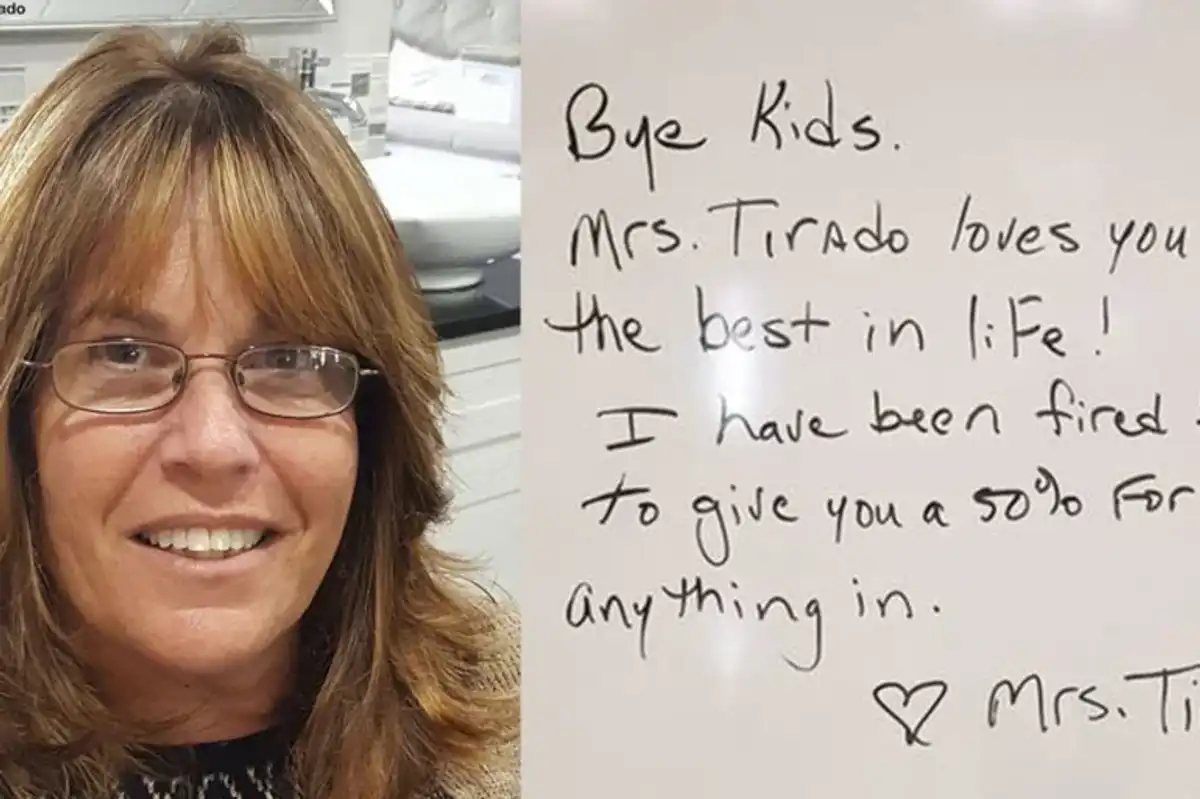Florida teacher fired for giving zeros to students who didn't turn in assignments
The lowest grade that teachers are allowed to give students is a 50.
Left: Teacher Diane Tirado. Right: The note she left for students after being fired.
If you're of the mind that kids today are being coddled and not properly prepared for the real world, well, you might want to buckle up for this one. The story out of a public school in Florida has parents and teachers alike up in arms.
A Florida teacher was fired for giving her students zeros for missing assignments. Diane Tirado has been a teacher for years. Most recently, she was an eighth-grade history teacher at Westgate K-8 School in Port St. Lucie, Florida. Diane recently gave her students two weeks to complete an Explorer notebook project, but several students simply didn't hand it in. Since there was zero work done, Diane gave them zeros.
She got fired for it.

The elementary school has a rule called the “no zero policy."
The lowest possible grade that teachers can give students is a 50, even if they don't turn anything in. That means that an extremely poor completed assignment is worth the same number of points as no assignment at all.
Hardly seems fair, right? Westgate is far from the only school that has such a policy, however.

It's a rule that Diane, unsurprisingly, does not agree with. After she was fired for disobeying, she left her students a charming goodbye message on the whiteboard.
"Bye kids. Mrs. Tirado loves you and wishes you the best in life. I have been fired for refusing to give you a 50 percent for not handing anything in. Love, Mrs. Tirado"
The scale, as outlined by the school, reads as follows:
A = 90 to 100
B = 80 to 89
C = 70-79
D = 60-69
F = 50-59
Diane later shared the story on Facebook, hoping to spread awareness about the school's policy.
“A grade in Mrs. Tirado's class is earned," she said.
“I'm so upset because we have a nation of kids that are expecting to get paid and live their life just for showing up and it's not real."
Diane's post has gone viral, and most commenters agree with her position – it's not fair to hand out grades for work that doesn't exist.
No zero policies are common in many schools, and teachers notoriouslyhate them. But it's at least worth considering why they exist. Some educators say it's because when a student earns a zero, it's very difficult for them to ever recover their grade in that class. In other words, it may be too harsh. Others argue that, if you don't want a zero, don't turn in nothing! Getting an earned-zero is a great way to learn to at least try.
A follow up statement from the school stated: "Ms. Tirado was released from her duties as an instructor because her performance was deemed sub-standard and her interactions with students, staff, and parents lacked professionalism and created a toxic culture on the school’s campus. ... During her brief time of employment at West Gate, the school fielded numerous student and parent complaints as well as concerns from colleagues. Based on new information shared with school administrators, an investigation of possible physical abuse is underway."
However, school representatives did not deny the existence of the no zero policy, and Tirado claims the school engaged in a smear campaign after she became a "whistleblower" on their policies. She's currently considering legal action against the district.
Still, the debate over the grading policy rages on.
“The reason I took on this fight was because it was ridiculous. Teaching should not be this hard," Diane said.
This article originally appeared 6 years ago.
- 8 classes that should be required for all students before they hit adulthood ›
- 'Judge me if you want': Kristen Bell on why she allows kids to drink non-alcoholic beer ›
- 20 years of data reveals that Congress doesn't care what you think. ›
- A teacher asked 7th graders what 30-year-olds want for Christmas and their answers are hysterical - Upworthy ›
- 6th-grade teacher resigns rather than remove absolutely harmless sign from her classroom - Upworthy ›
- Millennials look back with nostalgia at Scholastic Book Fair - Upworthy ›
- Florida teacher was fired after giving zeroes to students who didn't turn in their assignments - Upworthy ›
- Teacher explains why she "refuses" to give students zeroes, or any grade below 50% - Upworthy ›

